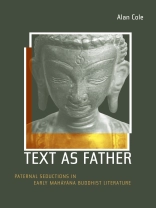This beautifully written work sheds new light on the origins and nature of Mahayana Buddhism with close readings of four well-known texts—
the Lotus Sutra, Diamond Sutra, Tathagatagarbha Sutra, and Vimalakirtinirdesa. Treating these sutras as literary works rather than as straightforward philosophic or doctrinal treatises, Alan Cole argues that these writings were carefully sculpted to undermine traditional monastic Buddhism and to gain legitimacy and authority for Mahayana Buddhism as it was veering away from Buddhism’s older oral and institutional forms. His sophisticated and sustained analysis of the narrative structures and seductive literary strategies used in these sutras suggests that they were specifically written to encourage devotion to the written word instead of other forms of authority, be they human, institutional, or iconic.
Tabela de Conteúdo
Acknowledgments
Introduction
1. Text as Father
2. Who’s Your Daddy Now? Reissued Paternity in the Lotus Sutra
3. The Domino Effect: Everyone and His Brother Convert to the Lotus Sutra 000
4. ‘Be All You Can’t Be’ and Other Gainful Losses in the Diamond Sutra
5. Sameness with a Difference in the Tathagatagarbha Sutra
6. Vimalakirti, or Why Bad Boys Finish First
Conclusion: A Cavalier Attitude toward Truth-Fathers
Bibliography
Index
Sobre o autor
Alan Cole, Associate Professor of Religious Studies at Lewis & Clark College, is author of Mothers and Sons in Chinese Buddhism (1998).







![Capa do Brian Schrag & Julisa Rowe: Community Arts for God's Purposes [Chinese] 貼近神心意的社群藝術 Capa do Brian Schrag & Julisa Rowe: Community Arts for God's Purposes [Chinese] 貼近神心意的社群藝術](https://static.worldofdigitals.com/thumb_webp/740/9781645083740.webp)




